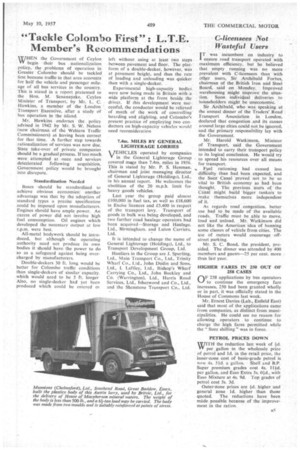"Tackle Colombo First": L.T.E.
Page 39

If you've noticed an error in this article please click here to report it so we can fix it.
Member's Recommendations
WHEN the Government of Ceylon Vv begin their bus nationalization policy, the problems of operation in Greater Colombo should be tackled first because traffic in that area accounts for half the vehicle and passenger mileage of all bus services in the country. This is stated in a report presented to the Hon. M. Senanayeke, Ceylon Minister of Transport, by Mr. L. C. Hawkins. a member of the London Transport Executive, after a study of bus operation in the island.
Mr. Hawkins endorses the policy advised in 1942 by Mr. S. W. Nelson (now chairman of the Western Traffic Commissioners) as having been correct for that time. A further step towards rationalization of services was now due. State take-over of private companies should be a gradual process. If too much were attempted at once and services deteriorated following acquisition. Government policy would be brought into disrepute.
Standardization Needed Buses should be standardized to achieve obvious economies: another advantage was that by the adoption of standard types a precise specification could be imposed upon manufacturers. Engines should have ample power. An excess of power did not involve high fuel consumption. Oil engines which developed the necessary output at low r.p.m. were best.
All-metal bodywork should be introduced, but although the operating authority need not produce its own bodies it should have the power to do so as a safeguard against being overcharged by manufacturers.
Double-deckers 30 ft. long would be better for Colombo traffic conditions than single-deckers of similar capacity. which would need to be 5 ft. longer Also, no single-decker had yet been produced which could be entered ot left without using at least two steps between pavement and floor. The platform of a double-decker, however, was at pavement height, and thus the rate of loading and unloading was quicker than with a single-decker. ,
Experimental high-capacity bodies were now being made in Britain with a wide platform at the front beside the driver. If this development were successful, the conductor would be relieved of much of the work of controlling boarding and alighting, and Colombo's present practice of employing two conductors on high-capacity vehicles would need reconsideration
7.4m. MILES BY GENERAL LIGHTERAGE LORRIES
VEHICLES operated by companies in the General Lighterage Group covered me than 7.4m. miles in 1956. This is stated by Mr. P. S. Henman. chairman and joint managing director of General Lighterage (Holdings), Ltd., in his annual report. He welcomes the abolition of the 20 m.p.h. limit for heavy goods vehicles.
Last year the group paid almost £100,000 in fuel tax, as well as :E18,600 in Excise licences and £3400 in respect of the transport levy. Transport of goods in bulk was being developed, and two further road haulage operators had been acquired—Storage and Haulage, Ltd., Birmingham, and Luton Carriers, Ltd.
It is intended to change the name of General Lighterage (Holdings), Ltd., to Transport Development Group, Ltd.
Hauliers in the Group are J. Spurling, Ltd., Main Transport Co., Ltd., Trinity Wharf Co., Ltd., John Dudin and Sons, Ltd., I. Leftley, Ltd., Bishop's Wharf Carrying Co., Ltd., John Buckley and Co. (Warrington), Ltd., Harris Road Services, Ltd., Isherwood and Co., Ltd., and the Shenstone Transport Co., Ltd.
C-licensees Not Wasteful Users
I T was incumbent on industry to ensure road transport operated with maximum efficiency, but he believed that empty running was no more prevalent with C-licensees than with other users, Sir Archibald Forbes, chairman of the British Iron and Steel Board, said on Monday. Improved warehousing might improve the situation. Soon individual deliveries to householders might be uneconomic.
Sir Archibald, who was speaking at the annual dinner of the Traders' Road Transport Association in London, declared that congestion and its causes around large cities could not be ignored, and the primary responsibility lay with the Government.
Mr. Harold Watkinson, Minister of Transport, said the Government intended to carry their transport policy to its logical conclusion. He would try to spread his resources over all means for transport.
Fuel rationing had caused less difficulty than had been expected, and the Suez Canal Proved not to be so vital to British economy as had been thought. The previous users of the Canal might build bigger tankers to make themselves more independent of it.
As regards road congestion, better use had to be made of the available roads. Traffic must be able to move, load and unload. Mr. Watkinson did not like the American idea of banning some classes of vehicle from cities. The use of meters would encourage offstreet parking.
Mr. S. C. Bond, the president, presided. The dinner was attended by 400 members and guests-25 per cent. more than last year.
HIGHER FARES IN 250 OUT OF 258 CASES
1.-IF 258 applications by bus operators
to continue the emergency fare increases, 250 had been granted wholly or in part, it was officially stated in the House of Commons last week.
Mr. Ernest Davies (Lab., Enfield East) said that most of the applications came from companies, as distinct from municipalities. He could see no reason for allowing operators to continue to charge the high fares permitted while the "Suez shilling" was in force.
PETROL PRICES DOWN WITH the reduction last week of -Id. VV per gallon in the wholesale price of petrol and Id. in the retail price, the inner-zone cost of basic-grade petrol is now 4s. 5-1-d, a gallon. Shell and B.P. Super premium grades cost 4s. Md. per gallon, and Esso Extra 5s. 0-1-d., with Esso Mixture at 4s. 9d. Top grades of petrol cost 5s. 3d.
Outer-zone prices are Id. higher and general zone ld. higher than those quoted. The reductions have been made possible because of the improvement in the ration.




























































































